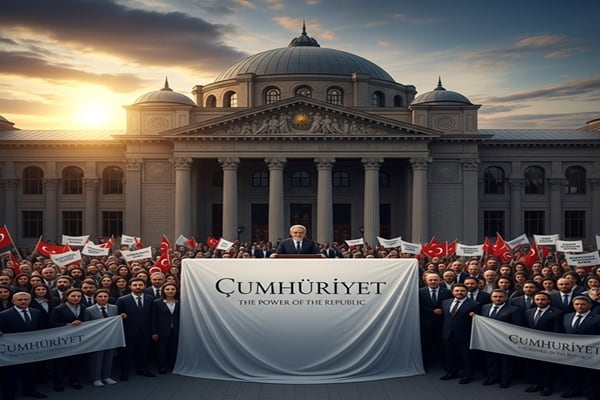When you hear the word Cumhuritey—derived from the Turkish word cumhuriyet, meaning “republic”—you’re not just looking at a simple political term. You’re looking at an idea that represents freedom, equality, and the power of ordinary citizens to shape their future. Instead of kings or autocrats holding control, Cumhuritey places that power firmly in the hands of the people.
But what does this actually mean in practice? Why is it so important today? And how can you, as an everyday citizen, embrace its values in your own life? Let’s explore together.
1. Where Cumhuritey Comes From: A Brief History
From Empire to Republic
The story of Cumhuritey begins in the ashes of the Ottoman Empire. After the Turkish War of Independence (1919–1923), the Republic of Turkey was officially founded on October 29, 1923. Its leader, Mustafa Kemal Atatürk, became the first president and introduced sweeping reforms that changed the nation forever.
This shift wasn’t just political—it was symbolic. It marked a transition from hereditary rule to a modern republic where the people, not rulers by birth, had the final say.
Atatürk’s Vision
Atatürk dreamed of a Turkey built on democracy, secularism, modernization, and civic pride. His reforms introduced new schools, advanced civil rights, and pushed for a society where citizens weren’t passive subjects but active participants. These ideals became the foundation of Cumhuritey.
2. The Core Principles of Cumhuritey
At its heart, Cumhuritey rests on a handful of timeless principles:
-
Popular sovereignty & democracy – The real power belongs to citizens through voting and civic involvement.
-
Secularism – Religion does not dominate government, allowing equal treatment for everyone regardless of belief.
-
Rule of law & equality – Everyone, from leaders to ordinary people, is accountable under the same laws.
-
Social justice & inclusion – Citizens share both rights and responsibilities.
-
Active citizenship – Democracy doesn’t stop at the ballot box; it thrives when people stay engaged year-round.
Think of these as the “pillars” of a modern, functioning democracy.
3. Why Cumhuritey Still Matters in 2025
Strengthening Civic Participation
In today’s digital world, Cumhuritey is more relevant than ever. Citizens now have access to online platforms, virtual town halls, and social media to voice their concerns. When people are informed and engaged, democracy becomes stronger.
Democracy with Purpose
True democracy isn’t just about voting every few years—it’s about demanding accountability, transparency, and responsible leadership every single day. Cumhuritey pushes us toward that ideal.
A Global Inspiration
The spirit of Cumhuritey doesn’t stop in Turkey. Similar models of citizen-led governance inspire countries worldwide: Switzerland’s direct referendums, Iceland’s citizen movements, and grassroots efforts across Europe and beyond.
4. The Challenges of Cumhuritey
Of course, no system is perfect. Even the strongest democracies face hurdles:
-
Tyranny of the majority – Sometimes, minority voices get drowned out in majority-rule systems.
-
Political fragmentation – Too many competing opinions can slow decision-making.
-
Instability – Excessive civic involvement without structure can stall progress.
-
Representation gaps – Marginalized groups often struggle to be heard.
-
Digital risks – Misinformation and unequal access to technology can distort true civic participation.
The key takeaway? Democracy requires constant care. It’s not enough to set it up once—it has to be nurtured and protected.
Also Read : Saqqara Pyramid Construction Technology: What We Know in 2025
5. How You Can Embrace Cumhuritey in Daily Life
Here’s the practical part: you don’t have to be a politician to live out the values of Cumhuritey. Here are some simple but powerful steps:
-
Learn civic basics
Understand your rights, how your government works, and the role of law in protecting equality. -
Vote and stay informed
Don’t just show up on election day—stay tuned into debates, policies, and how decisions affect your community. -
Engage in community discussions
Attend local forums, volunteer in civic groups, or even start conversations with neighbors. -
Support transparency and accountability
Ask questions, demand open governance, and hold leaders responsible. -
Use technology wisely
Advocate for inclusive, safe, and fact-based digital platforms. -
Protect minority voices
Be aware of underrepresented groups in your community and support their inclusion. -
Promote civic education
Encourage schools, universities, and even workplaces to teach the importance of democracy and active citizenship.
6. Frequently Asked Questions About Cumhuritey
Q1: What does “Cumhuritey” mean exactly?
It’s the Turkish word for “republic.” It describes a political system where power rests with the people through free and fair processes—not inherited rulers.
Q2: When did it begin?
It officially started with the foundation of the Republic of Turkey on October 29, 1923, led by Atatürk after the Ottoman Empire’s fall.
Q3: What values define it?
Popular sovereignty, democracy, secularism, justice, equality, and civic engagement.
Q4: Is it still relevant today?
Absolutely. From local activism to global governance models, its values shape how we think about modern democracy.
Q5: What are its biggest challenges?
Majority dominance, slow decision-making, gaps in representation, and the risks of digital misinformation.
7. Conclusion: Cumhuritey as a Living Idea
Cumhuritey is more than a system of government—it’s a vision of empowerment, equality, and shared responsibility. Born out of Turkey’s transformation under Atatürk, it stands today as a living example of how societies can evolve through collective willpower.
At its best, Cumhuritey reminds us that democracy isn’t a spectator sport—it’s something we all play a role in. By staying informed, protecting minority voices, and holding leaders accountable, we don’t just honor history; we keep its spirit alive.
As one Turkish citizen once said:
“Cumhuritey isn’t just about freedom—it’s about belonging. It’s the feeling that your voice, no matter how small, truly matters.”
And maybe that’s the greatest lesson of all.

